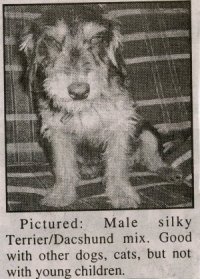
The Pocahontas County Humane Society ran this photograph in the November 17, 2005 edition of The Pocahontas Times, along with this description: "Male silky Terrier/Dachshund mix. Good with other dogs, cats, but not with young children." I don't know if he looks as wild-eyed and vicious in person as in this picture, but we couldn't stop laughing over him at our house. Not good with young children, no sir. On reflection, we decided he's probably already been adopted. The men of Pocahontas County love their feists, and this one looks especially feisty. This photo was probably a calculated choice.
I wanted to check the spelling of "feist" before I posted this, because it's a word I never heard before I moved here. This turned out to be a bigger project than I expected. "Feist" appears in print in John Fox Jr.'s The Little Shepherd of Kingdom Come (1898).
This is a fascinating book, and instrumental in generating the hillbilly stereotypes we in Appalachia so enjoy. I'll have more exciting quotes in the days to come. But back to "feists." I checked my compact edition of the OED, and learned two things. First, the magnifying glass that came with it and seemed so silly when I was in high school has turned out to be essential. That print gets smaller every year. Second, "fiste" meaning a dog is an Americanism first documented by Bartlett's American Dictionary in 1860. "Fisting cur" and "fisting hound" have an English heritage, with the earliest quoted usage from Sir Thomas More in 1524, "a little fisting cur.""That dawg'll kill them sheep," said Daws Dillon aloud.
Joel's face was red and his eyes rolled.
"Call that damned feist back, I tell ye," he shouted at last. "Hyeh, Rube, git my gun, git my gun!"
Rube started for the house, but Chad laughed. Jack had reached the other bank now, and was flashing like a ball of gray light through the weeds and up into the woods; and Chad slipped down the bank and into the river, hieing him on excitedly.
No comments:
Post a Comment